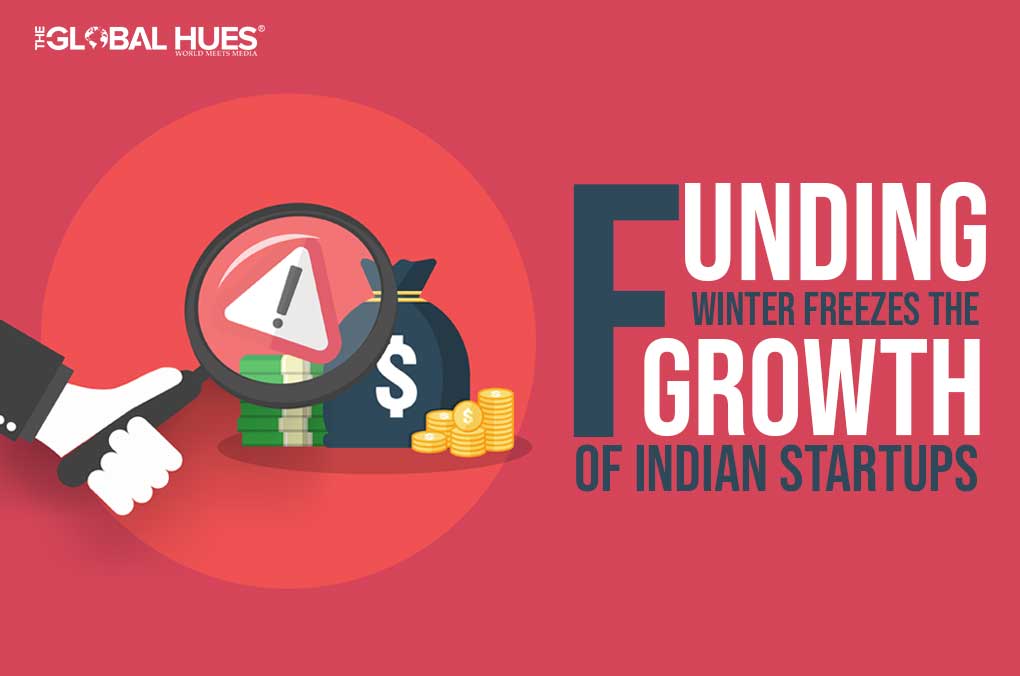India’s startup ecosystem was in full swing in the year 2021 and the first quarter of 2022 when the country produced many unicorn startups. This rapid increase makes India stand at the third position in the list of the World’s Largest Startup Ecosystem with a total of 107 unicorns right after U.S and China. But as it says “Nothing is permanent but change”. The same goes for startups in India. Many experts believe that impending funding winter can affect startups to a great extent.
The startup funding was at its peak in the year 2021. The funding for tech startups accounted for $14.8 Billion in the July-September quarter of 2021 which is considered the highest. The funding is declining steadily after that. Financial experts and venture capitalists believe that funding winter is good to control the over-investing and hyper valuations of the startups.
Is funding winter a wake-up call for startups or is it something that is affecting startups for a time being and will be over soon? Let’s understand the concept of funding winter and its effects on the startup ecosystem.
Why Is It Happening?
We dug a little deeper into statistics to help you understand better how real is winter funding. The funding in startups plunged by more than 82% in January 2022 and is predicted to remain so in the upcoming 15-18 months. In September 2022, startups raised a total of $810 million in the funding round, a fall of 58% on a year-on-year basis.
Tech startups are getting severely affected by the funding winter. According to the Traxcn survey, Indian tech startups raised only $885 million in August 2022 and only 10,000 companies received funding since last year out of 1,00,000 companies surveyed.
The statistics clearly show us that it is getting tough for startups to get funding for their business. Now the question arises if everything was going so well, how all of a sudden startups are finding it difficult to raise money?
The decline in funding is due to market slowdown and volatility because of macroeconomic and geopolitical situations, inflation and interest rates. To control the rising level of inflation, RBI increased the repo rate and restricted the cash liquidity in the market. Consequently, Investors and VCs started to invest in only those companies that bring profitability to the investors’ table.
How Is It Affecting Indian Startups?
Many investors and Financial experts believe that excess monetary investment is not healthy for startups and it may lead to the hyper-valuation of the company and “drunken” over-investing. To cope with the funding winter the startup ecosystem is now heading toward M&A activity. According to the report by PwC, there were a total of 54 M&A transactions in the second quarter of 2022. The most significant acquisition deals that happened during this period were Zomato’s acquisition of Blinkit and Swiggy’s acquisition of Dineout.
PwC anticipates more buyouts and acquisitions in the future triggered by a broader correction in the market.
However, funding winter does not mean that startups will not get any investment at all. Those companies that are truly bringing value to the business world are still getting the appropriate amount of funding. For instance, UpGrad, an edtech startup raised $225 million in July and $210 million in August 2022 despite the funding winter. EarlySalary, a Pune-based fintech startup is another example that raised funds of $110 million in September 2022 while other startups are surviving.
Funding winter is not going well for many Indian startups and they are finding ways to keep running their businesses. Rationalising their business vertices, startup companies are now cutting their costs by downsizing their workforce and closing the extra vertices. Recently, companies like Unacademy, Meesho, Cars24 and Vedantu have laid off employees in mass numbers stating the tense financial situations of the company.
Struggling to raise funds, smaller startups like Udayy, Lido Learning and Valud have shut down their operations. In addition to this, many big startups including Ola, Snapdeal and Oyo have delayed their plans of launching IPO in the market.
How Startups Can Survive the Funding Winter
Gone are the days when startups could raise a handsome amount of funding for their business based on their pitch only. Venture Capitalists and investors are becoming more sceptical nowadays. Startups must come with certain strategies, profitability numbers and a solid plan to survive the funding crunch. Here are some tips for startups that help them to survive the funding winter:
- Make sure that your business model has a solid base. Without the right business model, no investor is going to consider investing in your business because they might not find something valuable for them. So it is very important to prepare the right plan for your business model.
- Keep your future goals realistic. Always remember, Venture capitalists and investors are financial experts with years of experience, and they know what goals can be achieved and what can not be achieved. If your business goals are realistic, investors might take interest in your business.
- It is good to have an optimistic perspective but business comes with a lot of uncertainties also. So always prepare your business for unfortunate events in the advance.
Final Words
Building a startup is not easy as it sounds, it takes a lot of hard work and nurturing of ideas that make any startup successful. The road to success is bumpy for any startup. The world is standing on the verge of recession, where economies across the globe are struggling to cope with the inflation and rising price of everything. In this situation, it is not going to be easy for startups to raise funding for their businesses. Investors believe that funding winter is not going to be over soon, at least not before 12-24 months. Investors are optimistic stating that this funding crunch will normalise the sanity of the market.




